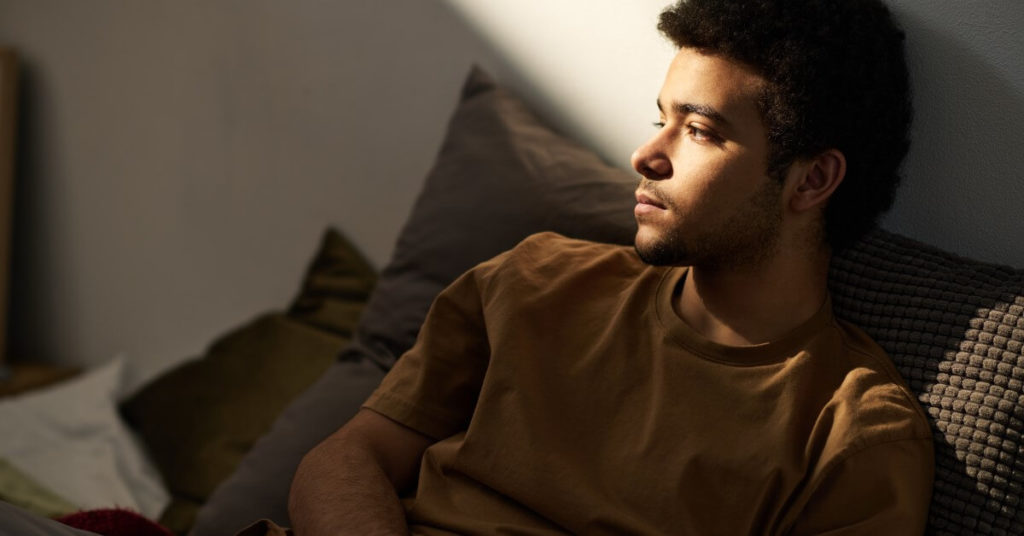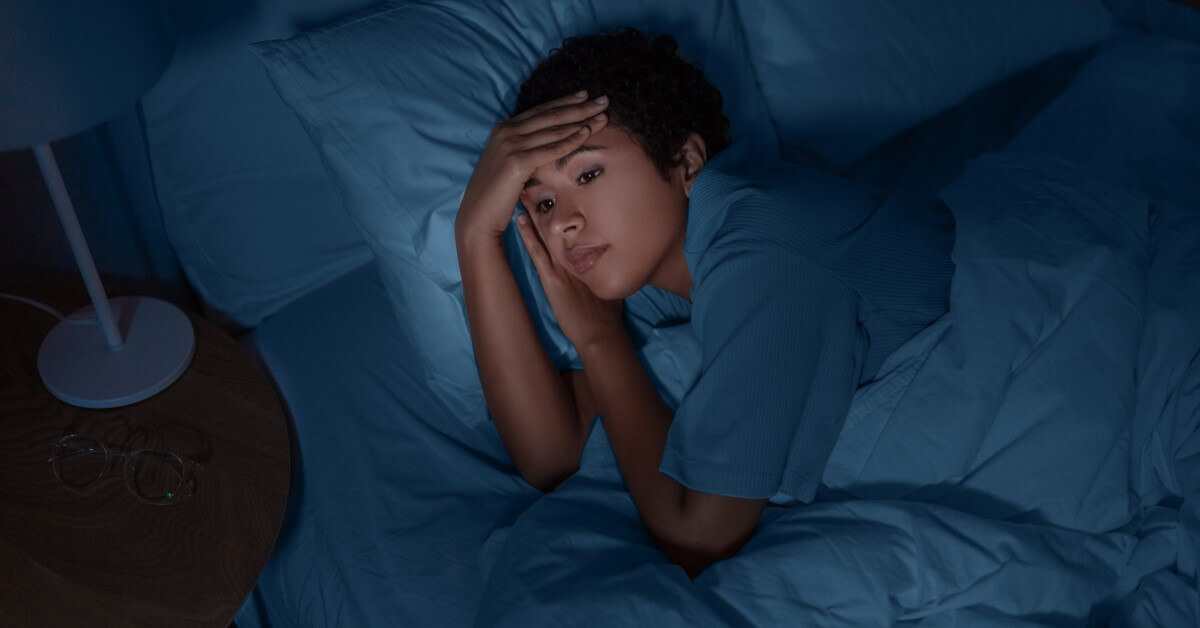
Medically reviewed by
Dacelin St Martin, MD
Triple board-certified in Sleep Medicine,
Internal Medicine, and Pediatrics.
The Link Between Mood Disorders and Sleep | Sleep and Specific Mood Disorders | How Can We Address Mood and Sleep Disorders?
Overview
When someone has a mood disorder, their sleep can get messed up, making it difficult to get adequate rest. They might struggle to fall asleep or stay asleep (insomnia) or can end up sleeping too much (hypersomnia).
These sleep problems can intensify mood disorders, causing tiredness, low energy levels, trouble focusing during the day, and mood swings. It’s like a never-ending cycle: mood disorders disrupt sleep, and disrupted sleep makes mood disorders even worse.
Keep reading to learn more about the bidirectional relationship between sleep and the two most common mood disorders: depression and bipolar disorder. By understanding how sleep and mood disorders affect each other, we can learn valuable insights to manage them better.
The Link Between Mood Disorders and Sleep
Mood disorders, such as depression and bipolar disorder, often come with sleep troubles.
Some people struggle to fall or stay asleep (insomnia), while others sleep too much or feel sleepy even after a long night’s rest (hypersomnia). These sleep problems can worsen mood disorders and affect how a person feels.[1]
For instance, not getting enough sleep can trigger mood swings and make existing issues like anger, anxiety, and depression feel even more intense. It can also lead to confusion, tiredness, and a lack of energy and enthusiasm.[2]
On the other hand, mood disorders themselves can disrupt sleep, causing difficulties falling asleep, sleeping too much, or unpredictable sleep routines.[3]
Understanding the relationship between mood disorders and sleep can help people improve their mental health and overall well-being.
Sleep and Specific Mood Disorders
Mood disorders are mental health conditions where people experience ongoing changes in their mood, emotions, and overall feelings. Depression and bipolar disorder are common examples. Interestingly, sleep problems can be both a cause and a result of these mood disorders.
1) Sleep and Depression
Depression is when a person feels very sad for a long time, loses interest in things they used to enjoy, and has trouble eating, sleeping, and focusing. Sleep problems are common in people with depression.
In the past, it was thought that sleep issues were just a result of being depressed. However, research shows that trouble sleeping can increase the risk of developing depression, no matter how old you are. It can also make depression come back again later.[4]
2) Depression and Hypersomnia
Depression is linked to a condition called hypersomnia (feeling extremely sleepy). People with hypersomnia struggle to wake up in the morning and feel tired all day. This extra sleepiness can make the fatigue and sadness of depression even worse.
Research suggests that sleep problems might happen before someone becomes depressed. Even people who don’t have depression but have family members with it can have trouble sleeping.
However, we still don’t fully understand how feeling excessively sleepy during the day can lead to depressive symptoms. Some experts think specific genes related to how our bodies work, our sleep patterns, and how we respond to stress could be involved.[5]
3) Depression and Insomnia
It’s known that depression can cause insomnia and make it hard for a person to sleep. Additionally, not being able to sleep can make depression symptoms worse and make it harder to feel better. New studies also found that trouble sleeping, like insomnia, can increase the risk of developing depression.
For instance, a study from Johns Hopkins University followed young men and discovered that insomnia was a significant factor in developing depression even after 30 years. Other studies have also shown that trouble sleeping can raise the chances of depression in both young and older adults.[4]
4) Sleep and Bipolar Disorder
Bipolar disorder causes mood swings that go back and forth between feeling very down (depressive phase) and feeling very high (manic phase).
When someone with bipolar disorder is in a manic phase, they may feel like they need less sleep than usual. But during depressive episodes, they may struggle with either being unable to sleep (insomnia) or sleeping too much (hypersomnia).[6]
5) Bipolar Disorder and Hypersomnia
When individuals with bipolar disorder feel sad and have low energy (depressive episodes), they may sleep excessively and struggle to wake up or stay awake. This excessive sleepiness can make the depressive phase last longer and make it hard to do everyday tasks.
During times of high energy and excitement (manic episodes), excessive sleepiness can also occur. That can make individuals feel tired, slow, and less intense during their manic episodes. As a result, the manic episodes may not be as strong or could last for a shorter time.
Overall, hypersomnia in bipolar disorder can disrupt the regular sleep routine, affect energy levels, and impact how long both depressive and manic episodes last.[7]
6) Bipolar Disorder and Insomnia
Bipolar disorder and insomnia have a bidirectional relationship: They can affect and worsen each other. Insomnia, a common issue among individuals with bipolar disorder, increases the risk of relapse and suicide attempts.
Not getting enough sleep can make manic symptoms more severe in bipolar disorder, causing individuals to have racing thoughts and become irritable. It can also increase the risk of impulsive behavior.
During depressive episodes, insomnia can increase feelings of sadness, fatigue, and lack of energy. Not getting enough restful sleep can make it harder to handle daily tasks and may make the depressive episode last longer.[6]
How Can We Address Mood and Sleep Disorders?
Sleep plays an essential role in maintaining our emotional and mental well-being. Without proper sleep, managing stress effectively, thinking clearly, and regulating our emotions becomes challenging. Therefore, addressing sleep problems and mood disorders is crucial to ensure optimal mental health.
The following simple yet effective actions can help people face the challenges of sleep and mood disorders:
● Stick to a Consistent Sleep Schedule: Set a regular bedtime and wake-up time, even on weekends, to regulate your body’s internal clock and improve sleep quality.
● Create a Calming Bedtime Routine: Establish a relaxing routine before bed, such as reading a book, taking a warm bath, or practicing relaxation techniques like deep breathing or meditation. Avoid stimulating activities and electronic devices that can disrupt sleep.
● Design a Sleep-Friendly Environment: Make your bedroom a peaceful sleep haven. Ensure it is quiet, dark, and comfortable. You could use earplugs, eye masks, or white noise machines to block out disturbances. Keep the room cool for better sleep.
● Limit Stimulants and Alcohol Consumption: Be mindful of your caffeine intake and avoid it, especially close to bedtime. Alcohol can also disrupt sleep patterns, so consuming it moderately or avoiding it altogether is best.
● Seek Professional Help: If sleep problems or mood disorders continue to impact your daily life, don’t hesitate to contact a healthcare professional. Healthcare providers can work together to develop a personalized plan that addresses both sleep and mood concerns.
By following these strategies, you can regain control over your sleep and mood disorders, leading to better overall well-being and a higher quality of life.
References:
- Asarnow, L. D., & Mirchandaney, R. (2021). Sleep and Mood Disorders Among Youth. Child and adolescent psychiatric clinics of North America, 30(1), 251–268. https://doi.org/10.1016/j.chc.2020.09.003
- Saghir, Z., Syeda, J. N., Muhammad, A. S., & Balla Abdalla, T. H. (2018). The Amygdala, Sleep Debt, Sleep Deprivation, and the Emotion of Anger: A Possible Connection?. Cureus, 10(7), e2912. https://doi.org/10.7759/cureus.2912
- Verkhratsky, A., Nedergaard, M., Steardo, L., & Li, B. (2020). Editorial: Sleep and Mood Disorders. Frontiers in psychiatry, 10, 981. https://doi.org/10.3389/fpsyt.2019.00981
- Fang, H., Tu, S., Sheng, J., & Shao, A. (2019). Depression in sleep disturbance: A review on a bidirectional relationship, mechanisms and treatment. Journal of cellular and molecular medicine, 23(4), 2324–2332. https://doi.org/10.1111/jcmm.14170
- Dauvilliers, Y., Lopez, R., Ohayon, M., & Bayard, S. (2013). Hypersomnia and depressive symptoms: methodological and clinical aspects. BMC medicine, 11, 78. https://doi.org/10.1186/1741-7015-11-78
- Harvey, A. G., Kaplan, K. A., & Soehner, A. M. (2015). Interventions for Sleep Disturbance in Bipolar Disorder. Sleep medicine clinics, 10(1), 101–105. https://doi.org/10.1016/j.jsmc.2014.11.005
- Comsa, M., Anderson, K. N., Sharma, A., Yadav, V. C., & Watson, S. (2022). The relationship between sleep and depression and bipolar disorder in children and young people. BJPsych open, 8(1), e27. https://doi.org/10.1192/bjo.2021.1076

